The NVIDIA GeForce GTX 750 Ti and GTX 750 Review: Maxwell Makes Its Move
by Ryan Smith & Ganesh T S on February 18, 2014 9:00 AM ESTPower, Temperature, & Noise
As always, last but not least is our look at power, temperature, and noise. Next to price and performance of course, these are some of the most important aspects of a GPU, due in large part to the impact of noise. All things considered, a loud card is undesirable unless there’s a sufficiently good reason – or sufficiently good performance – to ignore the noise.
| GeForce GTX 750 Series Voltages | ||||
| Ref GTX 750 Ti Boost Voltage | Zotac GTX 750 Ti Boost Voltage | Zotac GTX 750 Boost Voltage | ||
| 1.168v | 1.137v | 1.187v | ||
For those of you keeping track of voltages, you’ll find that the voltages for GM107 as used on the GTX 750 series is not significantly different from the voltages used on GK107. Since we’re looking at a chip that’s built on the same 28nm process as GK107, the voltages needed to drive it to hit the desired frequencies have not changed.
| GeForce GTX 750 Series Average Clockspeeds | |||||
| Ref GTX 750 Ti | Zotac GTX 750 Ti | Zotac GTX 750 | |||
| Max Boost Clock |
1150MHz
|
1175MHz
|
1162MHz
|
||
| Metro: LL |
1150MHz
|
1172MHz
|
1162MHz
|
||
| CoH2 |
1148MHz
|
1172MHz
|
1162MHz
|
||
| Bioshock |
1150MHz
|
1175MHz
|
1162MHz
|
||
| Battlefield 4 |
1150MHz
|
1175MHz
|
1162MHz
|
||
| Crysis 3 |
1149MHz
|
1174MHz
|
1162MHz
|
||
| Crysis: Warhead |
1150MHz
|
1175MHz
|
1162MHz
|
||
| TW: Rome 2 |
1150MHz
|
1175MHz
|
1162MHz
|
||
| Hitman |
1150MHz
|
1175MHz
|
1162MHz
|
||
| GRID 2 |
1150MHz
|
1175MHz
|
1162MHz
|
||
| Furmark |
1006MHz
|
1032MHz
|
1084MHz
|
||
Looking at average clockspeeds, we can see that our cards are essentially free to run at their maximum boost bins, well above their base clockspeed or even their official boost clockspeed. Because these cards operate at such a low TDP cooling is rendered a non-factor in our testbed setup, with all of these cards easily staying in the 60C or lower range, well below the 80C thermal throttle point that GPU Boost 2.0 uses.
As such they are limited only by TDP, which as we can see does make itself felt, but is not a meaningful limitation. Both GTX 750 Ti cards become TDP limited at times while gaming, but only for a refresh period or two, pulling the averages down just slightly. The Zotac GTX 750 on the other hand has no such problem (the power savings of losing an SMX), so it stays at 1162MHz throughout the entire run.
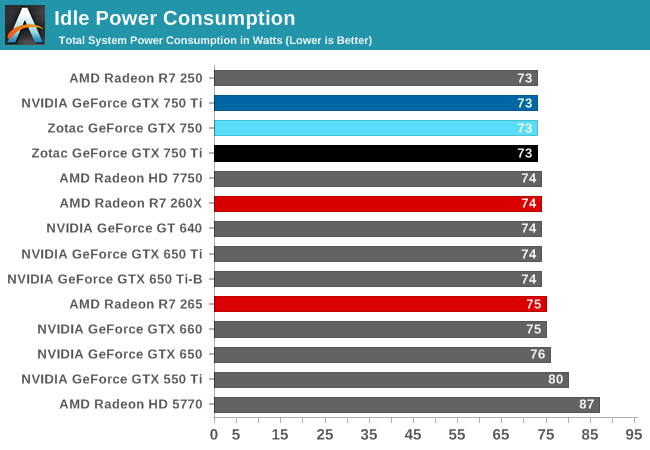
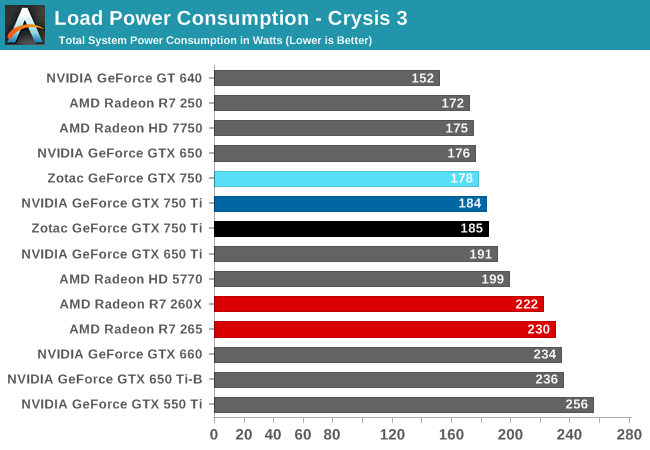
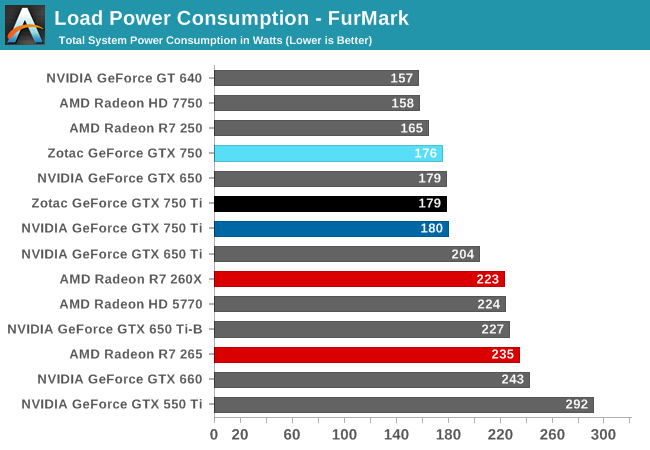
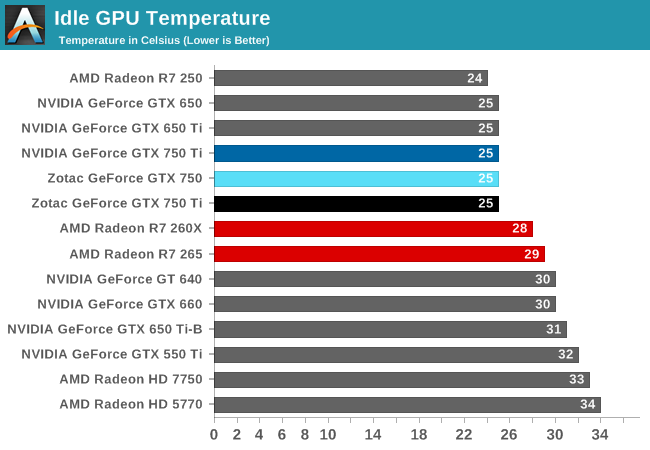
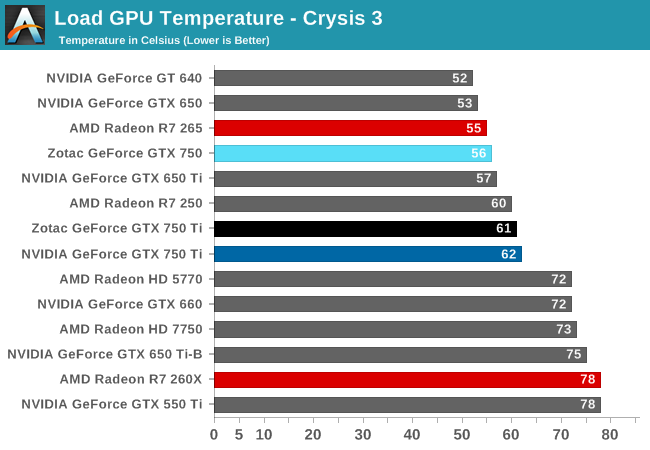
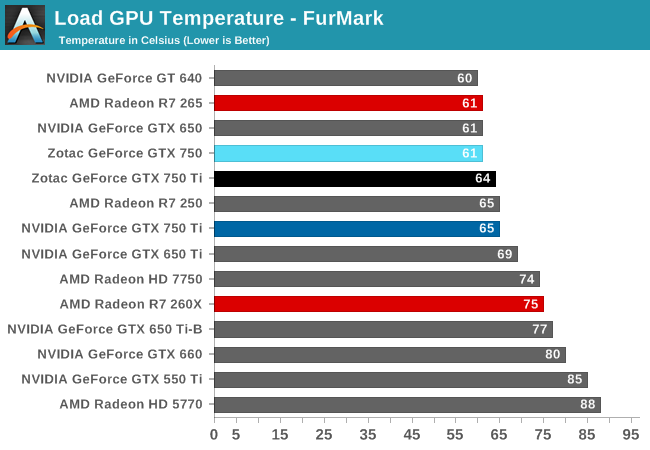
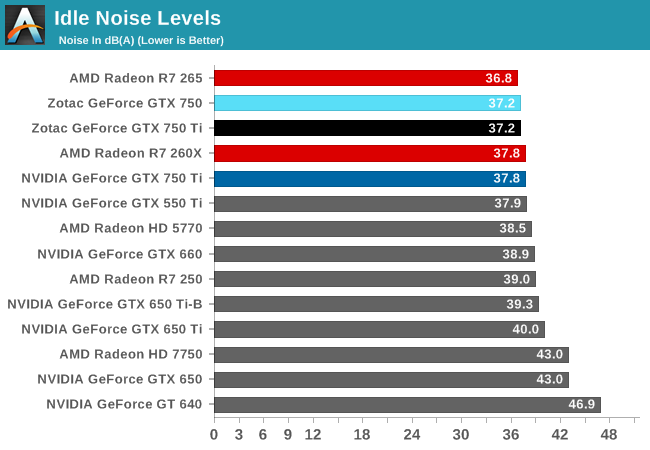
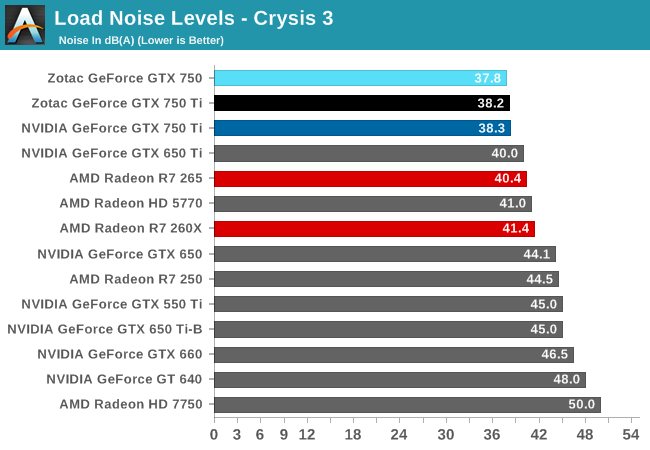
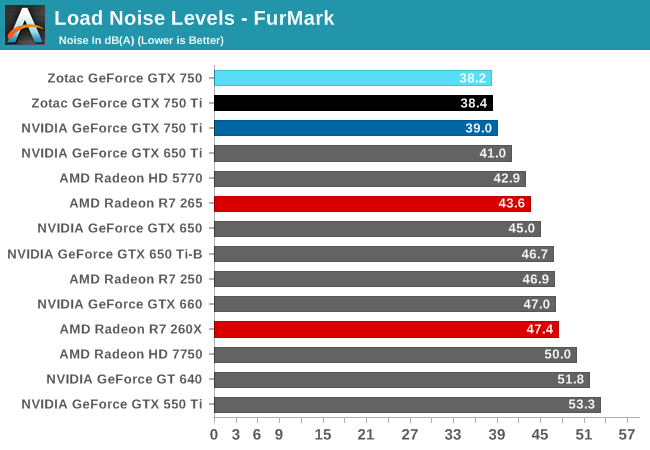










177 Comments
View All Comments
Harry Lloyd - Tuesday, February 18, 2014 - link
20 nm Maxwell will be epic. Gimme.TheinsanegamerN - Tuesday, February 18, 2014 - link
Imagine. OCed Geforce 690 level performance, out of a single chip, with 8 GB of RAM on a 512 bit bus, pulling the same amount of power as a geforce 770. One can dream....ddriver - Tuesday, February 18, 2014 - link
LOL, epic? Crippling FP64 performance further from 1/24 to 1/32 - looks like yet another nvidia architecture I'll be skipping due to abysmal compute performance per $ ratio...JDG1980 - Tuesday, February 18, 2014 - link
This card is designed for gaming and HTPC. Only a tiny fraction of users need FP64.nathanddrews - Tuesday, February 18, 2014 - link
So I guess we'll have to wait for the 750TIB before we can see SLI benchmarks. Two of these would be within reach of 770 while using considerably less power. Hypothetically, that is.ddriver - Tuesday, February 18, 2014 - link
You do realize the high end GPUs on the same architecture will have the same limitation?Morawka - Tuesday, February 18, 2014 - link
I thought the higher end Maxwell cards will have Denver/aRM cores on the PCB as well.Mr Perfect - Wednesday, February 19, 2014 - link
It might be a software/firmware limitation though. From what the compute enthusiasts have said, the only difference between the Titan's full compute and 780Ti's cut down compute is firmware based. They've got the same chip underneath, and some people hack their 780s for full compute. They're probably doing the same thing with the Maxwell stack.chrnochime - Wednesday, February 19, 2014 - link
Got link for the hack? Sounds interesting.Mr Perfect - Thursday, February 20, 2014 - link
I don't myself, but if you're interested look up IvanIvanovich over at bit-tech.net. He was talking about vbios mods and resistor replacement tweaks that can do that.